The brave acts of Chinese fishermen on east China’s Dongji Island to save British prisoners of war present lessons of peace building in time of war.
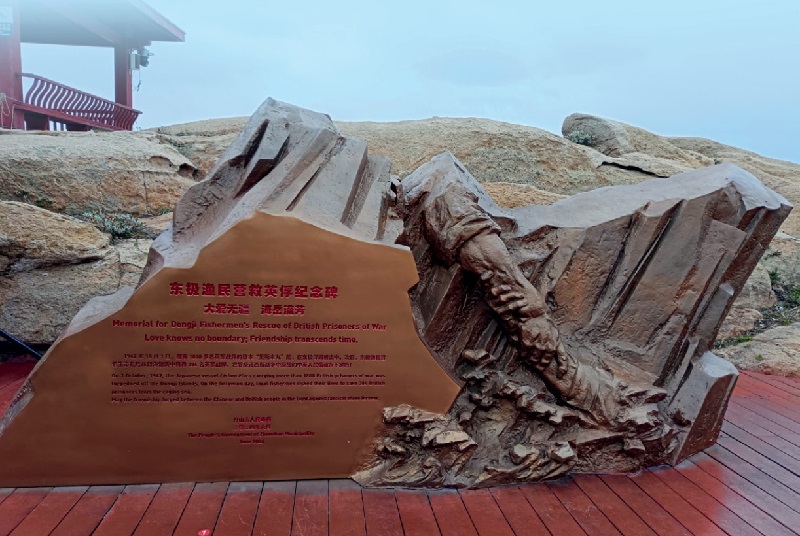
The Memorial for Dongji Fishermen’s Rescue of British Prisoners of War.
ON May 20, 2025, eighteen descendants of British prisoners of war (POWs) rescued in the Lisbon Maru incident arrived on Dongji Island in east China’s Zhejiang Province, after a long transoceanic journey. They joined descendants of the local fishermen who had saved their ancestors 83 years ago, gathering to witness the unveiling of a memorial erected in honor of the fishermen’s extraordinary bravery. At its center, the memorial bears the inscription: “Love knows no boundaries; Friendship transcends time.”
Eighty-three years ago, a cargo vessel named Lisbon Maru, requisitioned by the Japanese army transporting over 1,800 British POWs locked below decks from Hong Kong to Japan, was torpedoed by an American submarine, while entering the waters near Dongji Island. The attack occurred because Japanese forces had not marked the ship as a POW transport, violating wartime protocols. As the hull was breached, the ship began sinking rapidly. What followed was a horrific tragedy: over 800 British soldiers lost their lives, many by drowning, while others were shot trying to escape.
Amid the chaos, fishermen from the nearby Dongji Island rushed to help. Mobilizing every available boat, they braved treacherous waters to pull 384 drowning soldiers to safety. The memorial now immortalizes this act of courage. Its centerpiece features two hands clasped in an unbreakable grip. “These hands symbolize not only the fishermen rescuing prisoners, but the enduring bond between Britain and China,” explained Wu Xiaofei, a descendant of one rescuer. “The stronger hand embodies our resilient nation, brave, steadfast, yet profoundly compassionate. When hands unite, they bring safety and love,” she added. For descendants from both sides, the memorial stands as living proof that even war could not sever the bonds of human kindness that have connected their families from the first encounter till today.
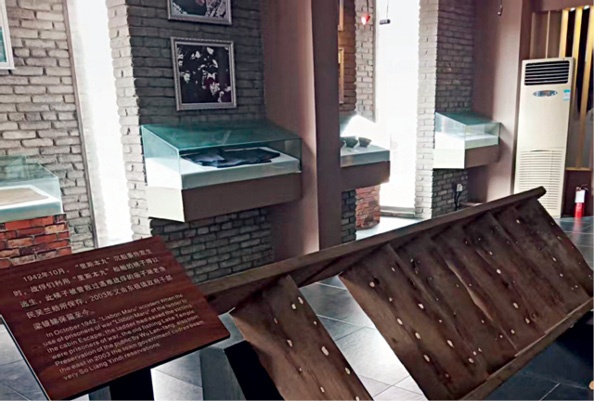
Exhibitions at the Lisbon Maru Rescue Memorial Hall.
The Power of a Helping Hand
On Dongji Island, every child grows up hearing about the rescue story, a tale of extraordinary bravery and kindness that has been passed down through generations. For locals like Wu Xiaofei and Liang Yindi, the legend is deeply personal. Their grandfathers were among the fishermen who risked their lives to save the British POWs. The rescue displayed a spirit of remarkable courage. Liang recounted how her grandfather and his brothers immediately launched their small fishing boats into the dangerous waters after hearing of the emergency. “They took two boats out four times, saving 26 men as a result,” she said. “They kept going until the sea fell silent again.” But the danger did not end after the rescue. Fishermen then hid three soldiers in a cliffside cave known as “Kid Cave” to evade repeated searches by Japanese soldiers for the missing POWs.
The islanders selflessly provided for the needs of the survivors. “My grandmother gave the prisoners the only spare clothes our family had,” Liang recalled. Villagers pooled together their limited supply of sweet potatoes and rice to cook porridge for the starving men. When clothing ran out, the fishermen scoured their homes and found bolts of precious blue homespun cloth. Using thick quilting needles, they quickly stitched together makeshift shirts and trousers. The British soldiers were deeply moved. Some broke down in tears as they received the simple garments, made with care from the islanders’ most valued fabric reserves.
Despite language barriers, compassion prevailed. Liang reflected, “Imagine this small island suddenly filled with survivors from the sea. It could have been terrifying. Yet no one hesitated. Love casts out all fear.”
The last rescuer passed away in 2020, and the POWs who survived are also gone. But their legacy lives on. Reflecting over what happened on that fateful day, Wu said, “This story is about war, but it’s more about ordinary people saving their fellow humans.” The rescuers’ children now continue to retell this tale to their own children, keeping alive the memory of that extraordinary October when Dongji’s fishermen proved that courage wears various types of uniforms, and that night it wore a fisherman’s patched jacket.
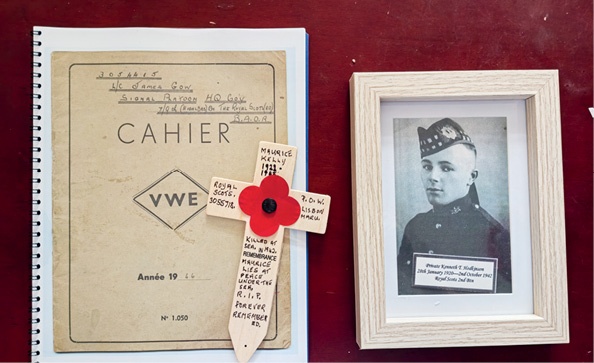
Meaningful gifts from descendants of the rescued British soldiers given to Liang Yindi in honor of their shared history.
Preserving the Spirit of Rescue
Liang Yindi, born in 1968, has been working at the Cultural Station of Dongji Town for 40 years. Since the opening of the Dongji History and Culture Museum in 2009, she has also served as a guide. The museum houses China’s only permanent exhibition on the Lisbon Maru incident, on its second floor. The Lisbon Maru Rescue Memorial Hall includes thirteen sections that chronicle the ship’s history, its being torpedoed and sinking, the daring rescue by Zhoushan fishermen, and the compassionate care given to the survivors.
Despite the challenges of building a museum on the remote Dongji Island, the local government completed the construction while facing a variety of difficulties, which stands not just as a tribute to the fishermen’s heroism, but rather a powerful testament to the universal values of courage, compassion, and international solidarity embodied in the event. Since its opening, the museum has welcomed a steady stream of visitors, including teachers, students, and people from social organizations, many of whom express profound emotion upon learning about this often overlooked history.
“I learned about this story when I was growing up, then later joined the cultural station, and now oversee the museum,” said Liang. Initially unsure why she was chosen for this role, her supervisor explained it was because she, as a local, carried the community’s trust. “I’ve invested deep personal feelings into this work. It’s more than just a job for me. It’s something much more meaningful that deserves all my passion and love.”
For decades, Dongji’s elders have kept the Lisbon Maru story alive through oral storytelling, passing down the spirit of this remarkable wartime rescue story to younger generations. Since 2016, the Dongji Cultural Station has further institutionalized this legacy by hosting seven annual Lisbon Maru History and Culture Festivals. These events feature guided museum tours with video testimonies from the rescuers, accompanied by interactive quizzes.
The commemorative efforts continue to evolve creatively. Local artists have produced themed fisherman paintings, as well as developed relevant cultural and creative products. A recently published oral history book and documentary films offer additional artistic interpretations. Younger generations also actively participate in keeping the memory of this story alive by creating Lisbon Maru-themed videos for competitions and delivering speeches at schools. Many descendants now volunteer as cultural ambassadors, helping to keep this collective memory alive. Through these diverse approaches from traditional storytelling to modern media, Dongji ensures the Lisbon Maru spirit remains vibrantly relevant across all ages.
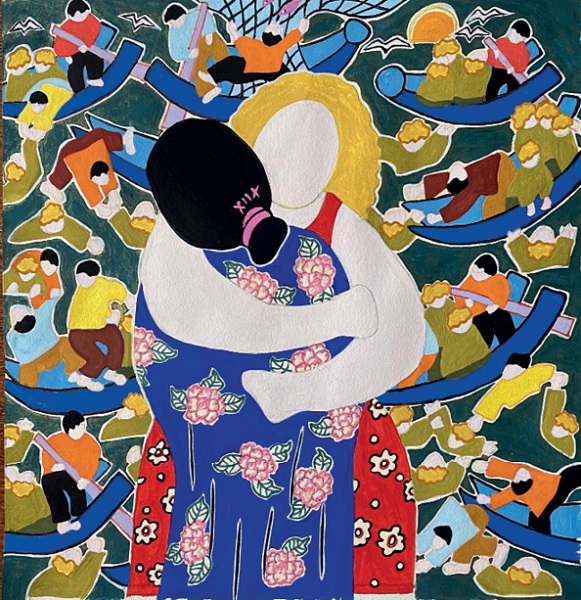
Wu Xiaofei and Jean Clemence sharing a heartfelt embrace upon reuniting. To commemorate this moment, Wu captured their warm hug in a painting, which she later presented as a gift to Clemence.
Enduring Bonds Across the Sea
The descendants of Dongji’s rescuers are preserving the Lisbon Maru legacy in their own ways by fostering friendships between China and Britain. Wu Xiaofei has built bridges of friendship between both countries through painting. Her vibrant works “The Lisbon Maru Rescue” and “Boundless Love” reimagine the 1942 tragedy through hope rather than darkness.
In 2004, while attending a training in Hangzhou, Wu and Liang learned of official efforts to preserve this history. Inspired at the thought, they decided to help share the story with the world through their easels. Where others might depict the event with grim colors, Wu chose radiant colors of blue and gold. “The horror belongs to 1942,” she explained. “Today we paint united nations and unbroken generations.”
Her “Boundless Love,” a creative reworking of a portion of “The Lisbon Maru Rescue,” features the details of the rescue. “The colors convey that courage outlives war,” she said. For Wu, this is generational duty, ensuring that the Lisbon Maru’s true legacy is celebrated in color, not merely mourned over.
Commemorative activities have also helped descendants from both nations cultivate deep personal connections. Last year, The Chinese Embassy in the U.K. held a “Spring Festival Celebration” in Gloucester, where descendants of both the rescued British POWs and Dongji fishermen gathered. During the emotional gathering, their voices blended in harmony as they sang “Auld Lang Syne” (For Old Time’s Sake) together. As the song reached its most heartfelt moments, British descendants and fishermen’s families instinctively reached for each other’s hands, and Wu and Liang exchanged heartfelt hugs with the British attendees.
“We were deeply moved by the song and just embraced each other naturally,” Wu recalled. “In that moment, no words were needed, just a shared feeling of peace and warmth.” This connection blossomed into a close friendship through letters between Wu and Jean Clemence, one of the British descendants present that day. Clemence wrote to Wu: “As a group of visitors, who were all personally affected by the Lisbon Maru incident, we had no idea what impact the incident had on the people of Dongji. For all of us it was breathtaking that an event which took place 83 years ago, could still be significant to all of your people.” Clemence also expressed a growing fascination with Chinese Culture. “I am now listening to the Analects of Confucius which hopefully will enable (me to) understand more of Chinese wisdom and culture as it is so different from ours,” wrote Clemence.
The enduring friendship between the rescuers and survivors’ grandchildren has now been passed down to their children. During the recent memorial ceremony, Clemence brought her son to Dongji Island. Wu Xiaofei’s son, now a police officer, warmly embraced and conversed with him. As a token of their shared values of protection and peace, the young policeman presented his British counterpart with a plush “Police Bear” toy – a lighthearted yet powerful symbol of their continuing bond.
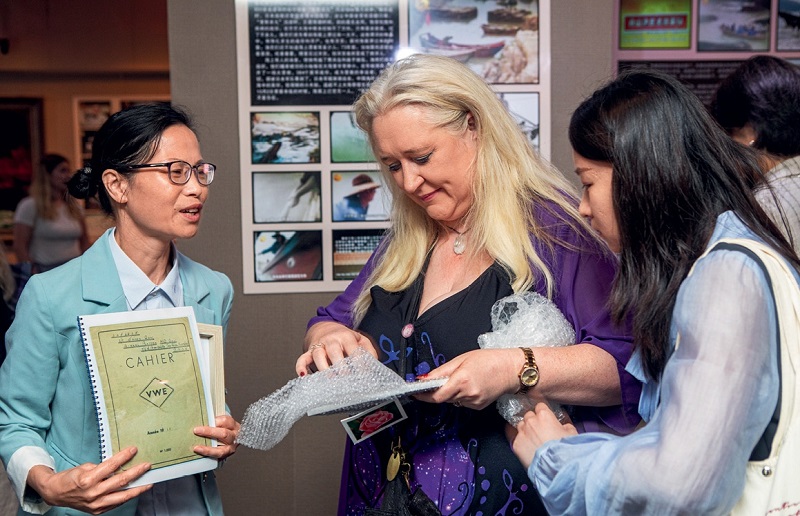
Two descendants of British POWs presenting gifts to Liang Yindi in the Dongji History and Culture Museum. Photos courtesy of Liang Yindi and Wu Xiaofei
LI WENYU is a teacher at Changji University.